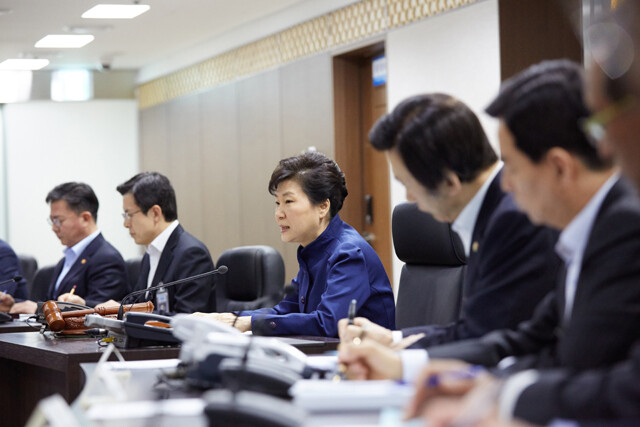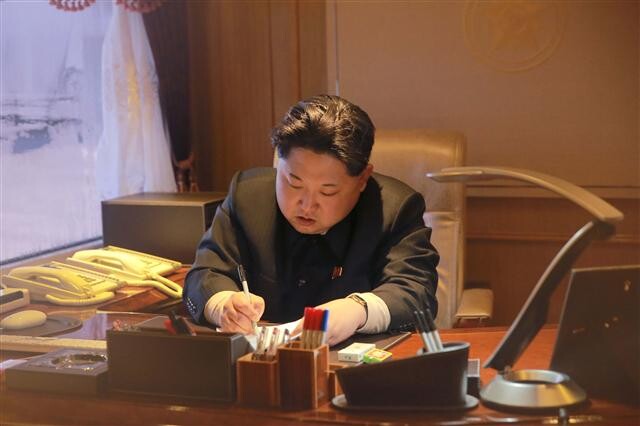hankyoreh
Links to other country sites 다른 나라 사이트 링크
[Column] A conspiracy to revive and perpetuate the Cold War regime

On a South Korean comedy show, there’s a skit called “Superhero.” The skit depicts a superhero who inflicts extreme pain on his own body in order to telepathically transmit that pain to his opponent.
South Korean President Park Geun-hye has just ordered the complete suspension of operations at the Kaesong Industrial Complex as a response to North Korea’s launch of a long-range rocket. But the Kaesong Complex profits the South more than the North. Even the government referred to this as an “agonizing decision.”
The comedy routine may earn a few laughs, but President Park’s decision is no laughing matter.
The Korean Peninsula is the locus of unending rivalry between the forces of the Cold War and the forces of peace. The interests of the Pentagon and Wall Street are tangled together.
Tensions on the Korean Peninsula are increasing because of North Korea’s recent nuclear test and rocket launch. While Pyongyang was responsible for the incident, the administrations of President Park and Japanese Prime Minister Shinzo Abe are reaping the political rewards.
South Korea’s exports in January plummeted 18.5% from the previous month last year. With her back against the wall, Park regards North Korea’s provocation as a chance to buoy her approval rating.
Following North Korea’s rocket launch, Park abruptly called on the National Assembly to pass anti-terrorism legislation. Refusing to do so, Park blustered, would be “tantamount to surrendering the security and safety of the Korean people to North Korea.”

The Saenuri Party (NFP) is pressuring opposition parties to pass North Korean human rights legislation as well.
In the words of Kim Seong-su, spokesperson for the opposition Minjoo Party of Korea, it is unclear what connection, if any, there is between the rocket launch and the anti-terrorism bill.
The ruling and opposition parties are currently debating a measure in the bill that would add an anti-terrorism agency to the National Intelligence Service. If such a measure were implemented, some are worried, civil liberties might be curtailed.
Furthermore, there is no telling how any of this could be connected to the North Korean human rights bill.
The government’s announcement of its decision to hold official deliberations with the US about allowing the THAAD (Terminal High Altitude Area Defense) system of interceptors to be deployed in South Korea is ridiculous, too. After all, North Korea’s long-range rocket is not aimed at South Korea.
China responded by immediately summoning South Korean Ambassador Kim Jang-soo to protest. China now seems to view South Korea as being the same kind of headache as North Korea. This is a worrying development in South Korea’s relations with China.
Tensions on the Korean Peninsula are rapidly returning to the Cold War confrontation between South Korea, the US, and Japan on one side and North Korea, China, and Russia on the other.
South Korean President Kim Dae-jung’s declaration of the end of the Cold War regime on the Korean Peninsula on Jan. 4, 1999 launched a series of talks and negotiations that included the Perry Process in 1999, the June 15 North-South Joint Declaration in 2000, the DPRK-US Joint Communique in 2000, the Sep. 19 Joint Statement in 2005 and the Oct. 4 Statement in 2007, but that series is now in danger of being ended permanently.
This is the culmination of North Korea’s provocations, the Park administration’s recklessness, the Abe administration’s ambition, China’s helplessness and the US’s inertia.
We must pay heed to the political calculations by vested interests inside South Korea and Japan that lie behind the revival of the Cold War regime on the Korean Peninsula. When foreign relations face a crisis, it gives hardline conservatives more leeway in domestic politics.
This coming July, Japan will be holding an election for the House of Councillors, the upper body of the Diet. Abe has announced that he will seize this election as an opportunity to revise Japan’s “Peace Constitution,” which bans the country from waging war and from possessing a regular military.
In response, Japan’s four major opposition parties - the Democratic Party, Communist Party, Innovation Party and Social Democratic Party - are working together to present a united front in the election. But these efforts are running into difficulties as hardline lawmakers from Japan’s Democratic Party change their tune after North Korea’s nuclear test. This is the conclusion drawn by Lee Bu-yeong, a former lawmaker who is familiar with the situation in Japan.
The situation in South Korea is similar. Figures who argue that opposition lawmakers need to present a united front in the capital area and Chungcheong Province if they are to prevent a landslide victory by the ruling Saenuri Party and to restore democracy have gathered together to launch the Forum for Democracy Again.
But the forum has almost entirely failed to attract interest. In the discourse between the forces that want to maintain the division of the Korean Peninsula for their own advantage and those seeking peace and democracy, the efforts by the former, who are opposed to the political process, to divide the opposition parties gives them a major advantage.
Furthermore, the confrontation between North and South Korea, which is getting progressively worse, will become a decisive obstacle to an election coalition by the opposition.
The problem is what happens after Apr. 13. If the Saenuri Party gains 200 seats in the National Assembly in that day’s parliamentary election, it looks like the party could push for amending the constitution to enable the conservative establishment to hold power permanently, as has happened in Japan.
Or are my fears ungrounded?
By Seong Han-yong, Political correspondent
Please direct questions or comments to [english@hani.co.kr]

Editorial・opinion
![[Column] Has Korea, too, crossed the Rubicon on China? [Column] Has Korea, too, crossed the Rubicon on China?](https://flexible.img.hani.co.kr/flexible/normal/500/300/imgdb/original/2024/0419/9317135153409185.jpg) [Column] Has Korea, too, crossed the Rubicon on China?
[Column] Has Korea, too, crossed the Rubicon on China?![[Correspondent’s column] In Japan’s alliance with US, echoes of its past alliances with UK [Correspondent’s column] In Japan’s alliance with US, echoes of its past alliances with UK](https://flexible.img.hani.co.kr/flexible/normal/500/300/imgdb/original/2024/0419/2317135166563519.jpg) [Correspondent’s column] In Japan’s alliance with US, echoes of its past alliances with UK
[Correspondent’s column] In Japan’s alliance with US, echoes of its past alliances with UK- [Editorial] Does Yoon think the Korean public is wrong?
- [Editorial] As it bolsters its alliance with US, Japan must be accountable for past
- [Guest essay] Amending the Constitution is Yoon’s key to leaving office in public’s good graces
- [Editorial] 10 years on, lessons of Sewol tragedy must never be forgotten
- [Column] A death blow to Korea’s prosecutor politics
- [Correspondent’s column] The US and the end of Japanese pacifism
- [Guest essay] How Korea turned its trainee doctors into monsters
- [Guest essay] As someone who helped forge Seoul-Moscow ties, their status today troubles me
Most viewed articles
- 1[Column] The clock is ticking for Korea’s first lady
- 2After 2 months of delayed, denied medical care, Koreans worry worst may be yet to come
- 3US overtakes China as Korea’s top export market, prompting trade sanction jitters
- 4[Column] Has Korea, too, crossed the Rubicon on China?
- 5[Correspondent’s column] In Japan’s alliance with US, echoes of its past alliances with UK
- 6Hong Se-hwa, voice for tolerance whose memoir of exile touched a chord, dies at 76
- 7[Editorial] When the choice is kids or career, Korea will never overcome birth rate woes
- 8Samsung barricades office as unionized workers strike for better conditions
- 9All eyes on Xiaomi after it pulls off EV that Apple couldn’t
- 10More South Koreans, particularly the young, are leaving their religions